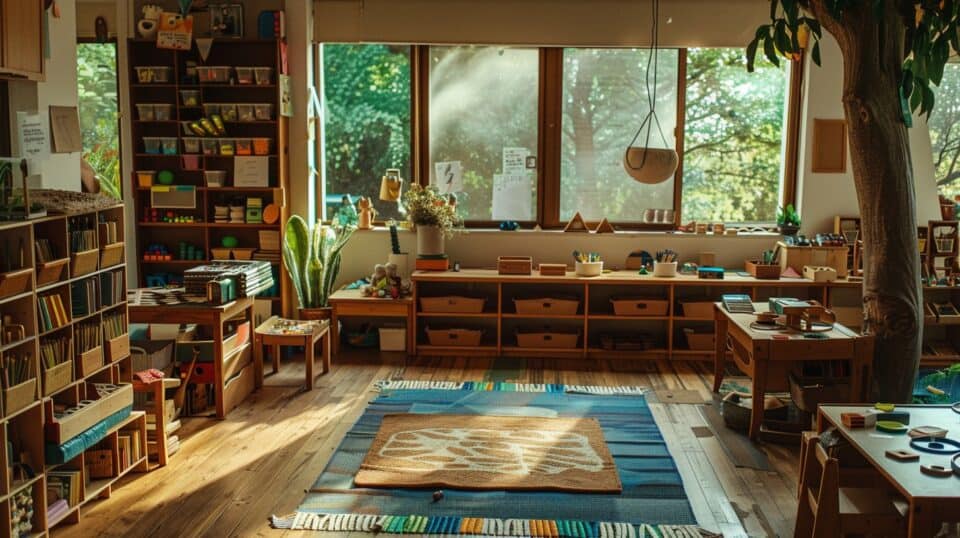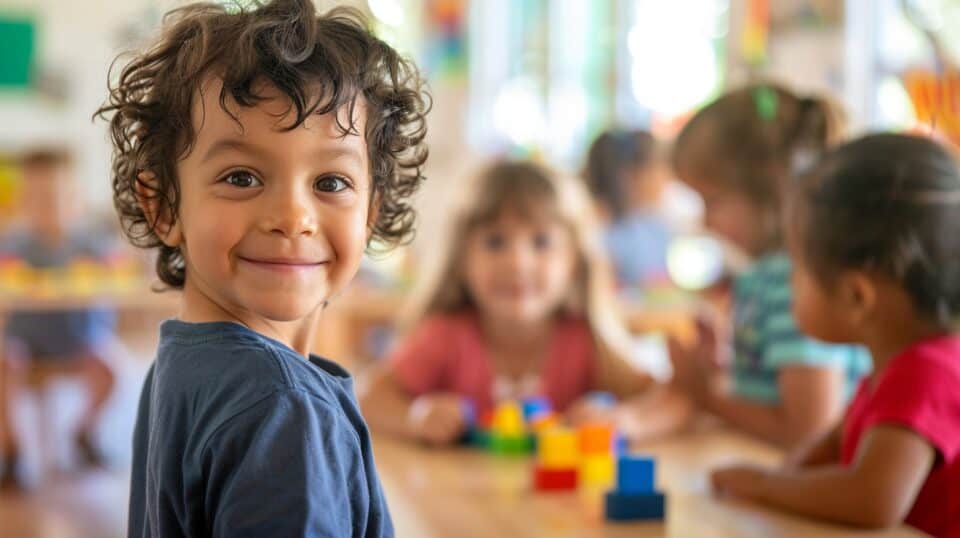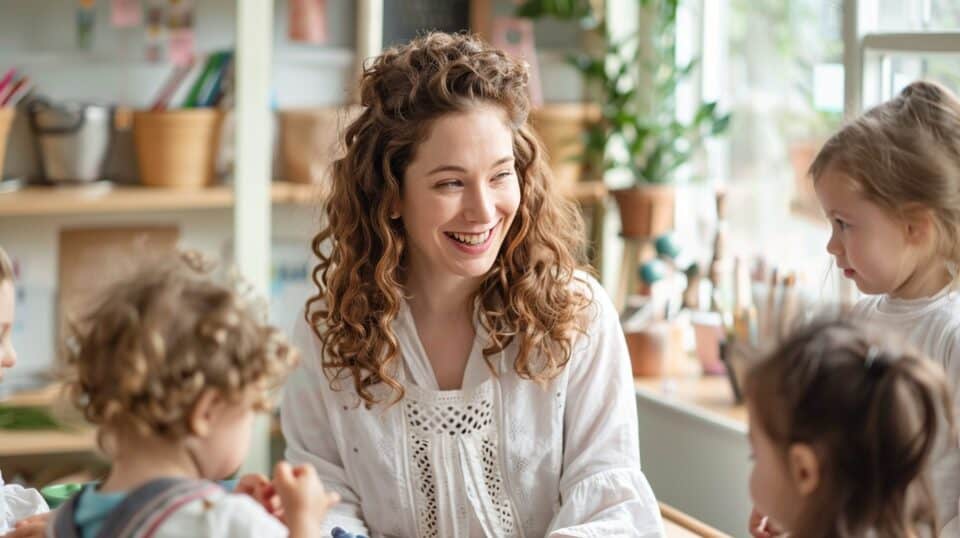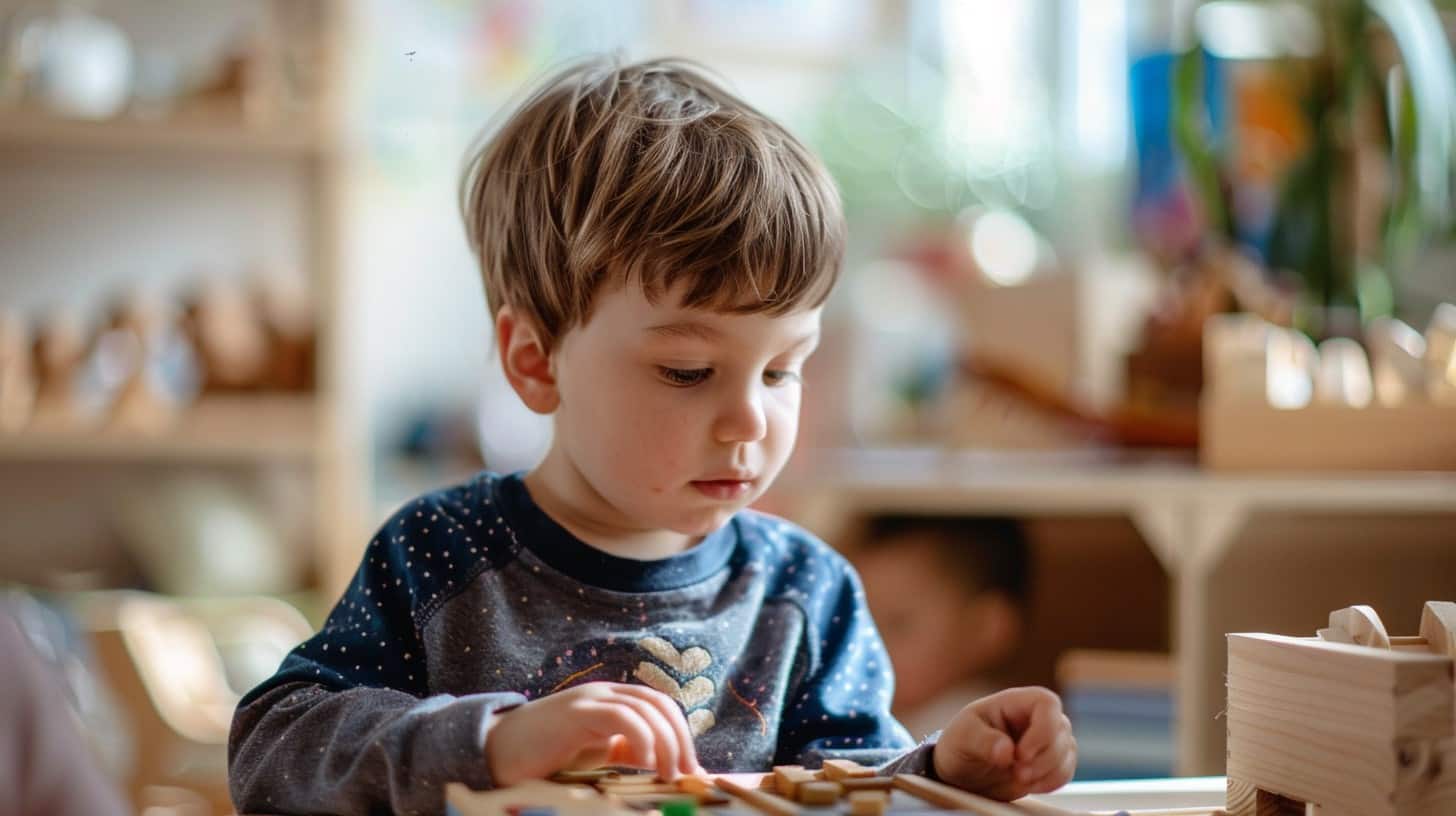You’re wondering if the Montessori approach is right for your child’s education. Over 100 years old, the Montessori method emphasizes hands-on learning and independence. This blog post explores the pros and cons — so you can make an informed decision.
Choosing your child’s educational path is a big deal… let’s get started.
Key Takeaways
The Montessori method emphasizes hands-on learning, independence, and self-discovery through a carefully prepared classroom environment that nurtures each child’s natural curiosity and interests.
Pros of Montessori education include independent exploration, fostering social interaction and self-reliance, encouraging a love for lifelong learning, and an inclusive approach that integrates children with special needs.
Potential cons are high associated costs, limited accessibility (especially for lower-income families), a loose curriculum structure with an overemphasis on independence that may overwhelm some children, and an open-ended classroom structure that could intimidate or confuse young learners.
Montessori teachers act as guides, facilitating child-led activities, creating mixed-age classrooms with hands-on materials, and fostering an environment that encourages independent learning at each child’s pace while developing the whole child.
Ultimately, the decision to choose Montessori education depends on weighing the pros and cons against your child’s individual needs, learning style, and your family’s resources and priorities.
Table of Contents
Understanding the Montessori Method

Transitioning from the introduction, let’s delve into the Montessori Method—an educational approach rooted in hands-on learning and self-discovery. Conceptualized by Dr. Maria Montessori in the early 1900s, this child-centered philosophy encourages independence, freedom within limits, and a nurturing environment tailored to each child’s unique needs.
The Montessori classroom is a meticulously prepared space—think low shelves, tactile learning materials, and purposeful arrangement—designed to entice children’s natural curiosity.
Mixed-age groups foster peer learning and leadership skills… while specially trained guides observe, gently redirecting when needed. A key focus? Fostering intrinsic motivation—because when you ignite a love for knowledge within kids, the drive to learn becomes unstoppable.
Pros of Montessori Education

Kiddo’s natural curiosity fuels their boundless potential – Montessori education harnesses this innate drive, nurturing a lifelong passion for learning. Independent exploration equips children with problem-solving prowess they’ll cherish forever.
Emphasis on hands-on independent learning
Montessori’s got hands-on learning nailed down to a science! Kids aren’t just passively absorbing info—they’re actively engaging with specially designed materials that bring abstract concepts to life.
Seeing, touching, and directly interacting with objects is how those little brains truly grasp ideas. The classroom setup plays a huge part too—child-sized Montessori furniture, materials within easy reach… it’s all crafted to spark curiosity and independent exploration.
Your kiddo’s not gonna be stuck at a desk all day—they’ll be up and moving, free to follow their interests and learn at their own pace. It’s an immersive, multisensory approach that turns education into an odyssey of discovery.
Promotion of social interaction
Montessori classrooms buzz with social interaction – kids collaborate, learn from each other in mixed-age settings. The environment sparks peer-to-peer exchanges, hands-on group work.
Children gain confidence, independence to interact freely with diverse ages… socializing comes naturally.
Inclusivity defines Montessori too – children with special needs learn side-by-side, fostering acceptance. The “follow the child” approach means personalized learning styles – ideal for developing healthy social skills.
Fostering of self-reliance
Montessori education has self-reliance at its core—kids learn to take care of themselves, their classroom, their work. By entrusting them with real responsibilities like pouring drinks or cleaning up after themselves, Montessori nurtures self-discipline, ownership… and yes, even practical life skills!
This hands-on approach empowers children to feel capable, self-motivated. They gain confidence by mastering tasks independently—instead of relying on adults. An early entrepreneurial skillset blossoms: self-starters who can manage time, problem-solve, persist through challenges.
Not to mention essential social skills like collaborating with peers. Self-reliance ramps up as kids progress… paving the way for independence long-term.
Encouragement of a love for learning
Nurturing a love for learning is at the core of Montessori education. Hands-on materials spark curiosity – young learners discover abstract concepts through touch, sight, and experimentation.
That self-driven exploration ignites a passion for knowledge that lasts a lifetime.
Mixed-age classrooms foster peer teaching and mentorship. Older children guide younger ones, solidifying their grasp… while the youngsters look up to “role models” just ahead of them.
Inclusive approach for special needs
Montessori’s philosophy is deeply rooted in individualized learning—kids progress at their own pace, guided by specially trained teachers. This inclusive approach seamlessly integrates children with special needs—no one’s left behind.
In fact, Maria Montessori herself opened the first “Casa dei Bambini” for underprivileged kids, setting an early tone of inclusion.
Importantly, Montessori classrooms are multi-age—younger children learn from older peers, older kids reinforce concepts by teaching younger ones. This supportive, nurturing environment benefits all students, special needs or not, ensuring that every child, including your stepdaughter, finds a place where they can thrive.
Cons of Montessori Education

Montessori education has its share of drawbacks, too. Yep, those tuition fees can really burn a hole in your pocket—and we’re not even talking about the fancy organic snacks yet! But hey, there are things money can’t buy… like easy access to a nearby Montessori school in your area, for instance.
High associated costs
One major drawback of Montessori education is its high cost – it’s pricier than traditional schools. Quality Montessori materials and teacher training don’t come cheap. Many fully-implemented programs have hefty tuition fees… making them inaccessible for lower-income families.
Let’s be real – Montessori schools ain’t your typical daycare. The specialized environment, hands-on learning approach, small class sizes – it all adds up. But hey, you get what you pay for, right? A unique, child-centered education philosophy tailored to nurture your kiddo’s natural curiosity and love for learning.
Limited accessibility
One major drawback – limited accessibility. Montessori programs ain’t cheap, folks. Most are private schools… charging steep tuition fees. So, these top-notch learning environments? They’re often out of reach for many families.
Harsh reality.
But hey, there’s a glimmer of hope! Some Montessori charter schools receive federal funding… making ’em free (or low-cost) for attendees. The catch? Limited seats – they use admissions criteria to regulate enrollment.
In light of these challenges, some families turn to homeschooling as an alternative, incorporating Montessori principles and materials into their home education setup. This approach allows parents to tailor learning environments to their child’s needs while managing costs more effectively.
Loose curriculum structure
One potential drawback? Montessori’s loose curriculum structure. Yeah, there’s no rigid syllabus or standardized tests — kids learn through hands-on exploration. But that freedom has pros and cons.
On one hand, it fosters creativity, self-motivation… children chart their own path based on interests. But skeptics worry: are crucial skills getting overlooked? Could kids fall behind in certain areas? It’s a trade-off — more flexibility means less “checking boxes.” A lot depends on the Montessori guides, tailoring lessons to each student.
Overemphasis on independence
The loose curriculum structure and overemphasis on independence can be a double-edged sword. While fostering self-reliance is great, there’s a risk of kids struggling with self-direction before they’re ready… leaving them adrift without enough guidance.
I’ve seen parents worried their overly-independent child has trouble following basic instructions or working collaboratively. The free-flowing classroom vibe is meant to spark curiosity, but the lack of structure can overwhelm some kids.
Potential intimidation from open-ended classroom structure
An open classroom—no desks in tidy rows, just areas for different activities. Sounds freeing, right? Well, it can overwhelm some kids. They see chaos… choices galore with no clear path.
Is this freedom or confusion?
Preschoolers often struggle with too many options—their young minds crave structure. The Montessori way gives independence, sure, but without enough guidance, indecisiveness sets in.
The Role of a Montessori Teacher

A Montessori teacher’s role? Guiding, not instructing — they “follow the child.” Yep, these educators facilitate child-led activities, create mixed-age classrooms, hands-on materials, and yeah… an environment that encourages independent learning at each kid’s pace.
It’s like they’re personal sherpas on every student’s journey!
They cultivate a love of learning, creativity, self-expression — developing the whole child (social, emotional, intellectual, physical). Special needs? No problem, Montessori schools welcome all with open arms and individualized education plans.
These teachers strive to “ignite the spark” in every student — nurturing their curiosity, confidence and can-do spirit from the get-go.
FAQs About the Pros and Cons of Montessori
What is the Montessori method of education?
The Montessori method is an educational philosophy focused on early childhood. It uses sensory-based materials and peer-to-peer learning to develop cognitive skills. Famous Montessorians include Jeff Bezos.
What are the pros of Montessori preschools?
Pros include hands-on, project-based learning tailored to each child’s pace. The Montessori model emphasizes self-care, awareness of surroundings, and inclusion of special needs. It nurtures independence.
Are there any cons to Montessori education?
Potential cons are the expensive tuition of many Montessori preschools. Some criticize the lack of team collaboration, standardized testing prep, and difficulty transferring credits later. The teaching method is child-led versus instructor-led.
Is Montessori good for kids with disabilities?
Yes, Montessori philosophy encourages special needs inclusion. The sensory learning materials and individualized lesson plans can benefit kids with intellectual, developmental, or physical disabilities.
How does Montessori compare to traditional preschool?
Unlike traditional preschool with an instructor-led, one-size curriculum, Montessori is child-guided. It focuses on hands-on math, language, geography, and practical life skills versus rote memorization.
At what age should I consider Montessori childcare?
Many parents start Montessori as early as infancy or toddlerhood, when the philosophy’s sensory experiences and self-directed learning can shape cognitive development from the start.



